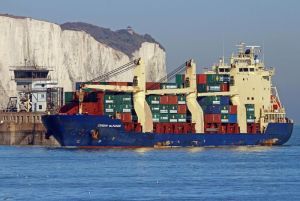Archives
Feature, Freight News, Sea
The unsung heroes of the supply chain
[ April 9, 2020 // Chris ]Chief executive of the British Ports Association, Richard Ballantyne has described ports and their workers, who are keeping imports of foods, essential products, energy and fuel coming into the country during the coronavirus situation as “unsung heroes”.
He said: “The key workers across the UK include those in the ports, shipping and logistics industries who are literally ensuring the nation is fed and supplied, and helping us overcome Covid-19. However to continue to do this, UK ports do need some assistance from policy makers.
He said that ports need personal protective equipment (PPE) and testing capabilities to keep the workforce resilient, adding: “Many operators in our ports industry will also need to access assistance from the Government’s financial support schemes and this assistance could be needed well after the lockdown finishes.
Port employees are working hard and keeping the UK’s gateways open. Following the Government’s recent advice about isolation, there was predictably a general increase in port employee absence as people followed national advice but tThe initial spike has calmed somewhat and port operators are reporting only absence rates, still largely for people self-isolating although some who were unfortunately suffering from Coronavirus.
“Those across Government are of course doing their best to protect the country’s population from both the health risks and potential negative economic impacts. There will be many competing requests and pleas from industry but the needs of ports need to be heard. To come through these challenges we will need to keep the country supplied and maintain our significant volumes of internal trade and this means ensuring the ports industry survives intact.”
Ballantyne said that unlike some other industries, most ports are unable to drop all their tools and close their gates. Even reducing services is difficult for port businesses as have many fixed costs and while some can furlough staff, many port functions must continue. Even when shipping and maritime activities reduce dramatically, ports must ensure all services are maintained, such as managing marine operations, keeping channels dredged and quays manned, often with a full suite of staff.
Ports are also facing requests for ‘rent holidays’ from tenants and a reduction in harbour and cargo dues from port users.
Data recently released for January, showing exports down by 3.2% to EU markets and by 7.8% to the rest of the world. Shipping specialists have however forecast a 20% reduction in world trade in the first quarter of 2020 and six million few global container movements in the same period.
Many ferry operators are now reducing passenger capacity and the numbers of sailings.

After the initial much-publicised deep-sea container traffic slowdown in February and which saw a reduction in mainly imports of between 25% – 30% in early March following the effective shutdown in Chinese manufacturing and exporting, with the Chinese economy fully active again there appears to be an abundance of traffic being shipped from Asia to Europe which will start to arrive in the coming weeks.
There are though concerns that with the shutdown of UK and neighbouring economies and the dramatic drop off in demand for non-essential products, much of this cargo could be held up. Some operators are concerned about increasing box dwell times and congestion with containers potentially needed to be stored at ports, warehouse, logistics parks until the lockdown finishes.
Despite some suggestions from short-sea operators who have said they have plenty of capacity, it would appear as though diverted container traffic and short sea shipping solutions either from container or ro-ro options are not likely or feasible.
Some ro-ro operators have seen relatively healthy freight volumes, particularly fresh, produce, foods, medical, cleaning products and other grocery supplies. However, since the government’s lockdown announcement, ro-ro freight volumes have been declining as demand from non-essential business and shops decreases.
The closure of vehicle manufacturing plants in Britain and Europe has seen a dramatic decline in finished trade car imports and which has also impacted Ro-Ro and container freight demand for components and materials.
Generally, most dry bulk cargos were holding up well until the Government’s lockdown announcement and should remain fairly constant in the coming weeks as farming and food production. As with ro-ro sector, however, following the government announcements demand is falling other trades such as timber are beginning to slow.
In particular, decisions made by the house-building sector to cease construction are likely to have an impact on port throughputs and indeed some ports have been asked to store cargos until activity resumes. Biomass remains stable although there have been operational challenges for ports handling this cargo in acquiring PPE for staff to deal safely with dusty cargos. One shipping company said there had been a lag on steel and metal handling, and while the materials for the canning of foods is in high demand, generally these cargos are expected to slow along with other traffic.
Paper pulp though has been in high demand for the toilet roll and tissue manufacturers. Some ports have reported record quantities.
Oil and petroleum cargos have seen the substantial impact from deflated oil prices along with storage demand for certain fuels such as aviation jet fuel.
Chemicals for manufacturing are slowing although not for essential industries. Other liquid bulks such as orange juice have remained plentiful across Europe and some tanker owners are talking to certain ports about ship layups and storage.
Tags: British Ports Association (BPA)














